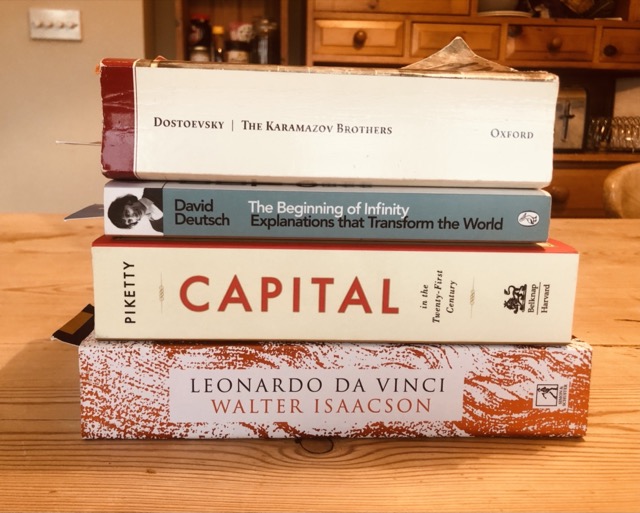Taking notes from books is one of the most valuable practices in my life. Though the process can be tedious, it offers so much value to both your experience of the book now and later on. Rather than skimming and merely getting the gist of the material, I try to absorb as much value as possible and compress this into notes for general use.
The way I take notes differs with the type of book I’m reading. I will explain the process for (1) dense non-fiction, (2) classic and contemporary books and (3) general fiction.
1. Dense non-fiction
This is the most note-heavy genre of book I read. This includes books such as the Beginning of Infinity (David Deutsch), Zero to One (Peter Thiel) and 21 Lessons for the 21st Century (Y.N. Harari). These books often contain lots of ideas and thought-provoking material that I want to reflect on and record for future use.
I usually read these sorts of books in chapters and underline key points and interesting ideas in pencil on the page, sometimes with annotations on the side. When I finish the chapter, I go onto the Notion page I have made for the book and record down key quotes, the main points, my thoughts on the material and any unknown words or points to research.
After I have done this for all of the chapters, I have a detailed summary of the book, some key quotes, some research and my thoughts and reflections on the material. This helps with retention, comprehension and gives me a lasting record of the book for the future.
2. Classics and Contemporary fiction
The next type of books I take notes from are classic novels and contemporary fiction. This includes books like Les Misérables (Victor Hugo), The Handmaid’s Tale (Margaret Atwood) and The Overstory (Richard Powers). I usually just underline interesting quotes on the book itself and then type up some notes on the plot and character development. These novels are often deeper and more complex than the next category of fiction, which is really just books I read for enjoyment.
3. Other fiction
Some fiction is just meant to be read and enjoyed. These are books by authors like P.G. Wodehouse, Bill Bryson and J.R.R. Tolkien. With these books I usually just read through them and soak up as much enjoyment as I can. Whilst I sometimes type up some quotes and thoughts, there isn’t a usually a need to take detailed notes from these kind of books.
Why take notes from books?
- It lets you remember more of what you read
- You can reflect more on what you read
- You can record quotes, insights and wisdom for later use
- You can critically engage with the material- constantly asking yourself what you think of it
- You can develop a bank of knowledge for the future
Conclusion
Ultimately, when I read non-fiction books I want to be having a debate with the author in my head. I constantly ask questions like ‘do I agree with this’, ‘what evidence is there for this’, ‘is their reasoning logical’ in order to think critically about the material at hand.
When reading fiction books, I sometimes write summaries and record quotes depending on how deep and complex the book is. However, with ‘light fiction’ it is often better to just read the book and soak up as much enjoyment as you can.
Overall, the amount of note-taking I do depends on the type of book I’m reading. In general, it is something that has really helped me over the past year and I would recommend adopting a similar habit to any other readers.



